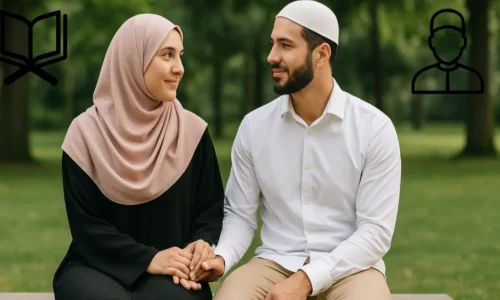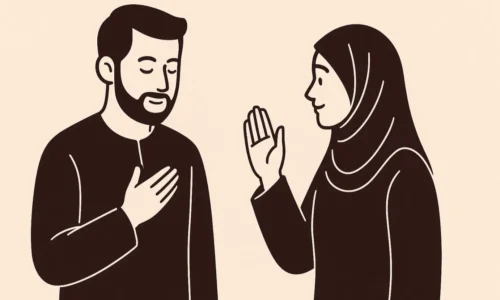Types of Zina in Islam are not limited to physical acts alone. Islam explains that Zina can mean different things—some happen openly and some occur in secret within the mind and heart of the person. Understanding the different types of Zina in Islam is important for every Muslim who wishes to live a life of purity and obedience.
Any unlawful intimate act outside a proper marriage is called Zina in Islamic faith. Adultery and fornication are included, as well as sins such as enjoying lustful looks, inappropriate words or sinful thoughts. In Islam, Zina is considered a major sin (kabirah) because it damages good morals, breaks families and introduces corruption into society.
Zina is clearly declared as a serious offense by the Shariah. Warning believers about Satan’s dangers, Allah speaks of them in the Quran and the Prophet Muhammad ﷺ highlighted them in many Hadiths. Faith and honor should be protected by avoiding anything that leads to these forms.
What is Zina in Islam?
Islam considers Zina as a very serious sin. Whatever the case, having a non-marital sex relationship is a form of adultery—be it someone married or not. In Islam, it has a more profound meaning than the basic idea. Zina includes anything that prepares for it, for instance, lustful looks, flirtatious talk and sexual desires.
The Holy Quran strongly warns against approaching Zina:
وَلَا تَقْرَبُوا الزِّنَىٰ ۖ إِنَّهُ كَانَ فَاحِشَةً وَسَاءَ سَبِيلًا
“And do not approach unlawful sexual intercourse. Indeed, it is ever an immorality and is evil as a way.” — Surah Al-Isra (17:32)
Allah forbids staying away from Zina, not just doing it. It demonstrates that Islam does not just prevent the crime, but every practice or path leading up to it too. Amongst these, being with someone who is not your relative in seclusion, looking at immoral pictures or videos and flirting are included.
Prophet Muhammad ﷺ mentioned that Zina acts as one of the severe forbidden acts (كبائر) in the faith. Islamic scholars frequently relate it to the loss of faith, the destruction of modesty and the ruin of whole communities.
The concept of Zina shouldn’t be limited to stopping one action. Staying cautious with your eyes, heart, words and actions will help you live for Allah’s approval.
Major Types of Zina in Islam
Islam holds that Zina includes both sexual partnerships and invisible offenses. Lesser-known sins are yet serious and lead to danger within the soul. Below are the major types of Zina in Islam, as explained by the Prophet Muhammad ﷺ.
1. Physical Zina (Zina al-Furuj)
This means having unlawful sexual intercourse between an unmarried man and woman. It is considered the greatest and most severely punished offense against Zina under Islam. If a married person is found guilty of Hudood, they may be lashed or stoned, but only if certain strict proof is provided.
The Prophet Muhammad ﷺ said:
لَا يَزْنِي الزَّانِي حِينَ يَزْنِي وَهُوَ مُؤْمِنٌ
“The one who commits Zina is not a believer at the time he is committing it.” — Sahih al-Bukhari & Sahih Muslim
The Hadith explains that when this serious sin happens, a person’s heart becomes free from faith.
2. Eye Zina (Zina al-Ayn)
Eyes can sometimes lead to Zina. If someone lets their desire for another overpower them or views sexual material, this can lead to it. In today’s digital age, this type of Zina is widespread and often ignored.
The Prophet ﷺ warned:
العَيْنَانِ تَزْنِيَانِ وَزِنَاهُمَا النَّظَرُ
“The eyes commit Zina, and their Zina is the (lustful) look.” — Sahih Muslim
Mere desire in a look can lead someone to commit more serious sins.
3. Ear Zina (Zina al-Uzn)
Someone can commit Zina by hearing vulgar words, lewd tales or music that has sexual themes. Like the eyes, the ears give us access to the heart.
Such type may be hard to notice, but it supplies bad ideas and weakens a person’s sense of modesty.
4. Tongue Zina (Zina al-Lisan)
Zina of the tongue includes anything like flirting, using sexy words, joking in a suggestive way or talking romantically with someone you’re not married to. These words are able to harm someone’s inner being even though they do not affect the body.
The Prophet ﷺ included this in his famous Hadith about the body parts:
وَاللِّسَانُ يَزْنِي وَزِنَاهُ الْكَلَامُ
“…and the tongue commits Zina, and its Zina is speaking (with desire).” — Sahih Muslim
In Islam, every word matters a lot, mainly when someone says something with bad motives.
5. Heart Zina (Zina al-Qalb)
This is the Zina of desire. When someone wishes or imagines unlawful sexual feelings, it counts as Zina committed in the heart. Allah is aware of all that is kept secret from the world.
(يَعْلَمُ خَائِنَةَ الْأَعْيُنِ وَمَا تُخْفِي الصُّدُورُ )
“He knows the treachery of the eyes and what the hearts conceal.” — Surah Ghafir (40:19)
Looking after your heart is the key to avoiding all kinds of Zina.
Also read: How to Repent in Islam for Zina
Why Islam Prohibits All Forms of Zina
All kinds of Zina are forbidden in Islam because they cause serious damage to people, families and society. All kinds of Zina—whether known openly or secretly, physical or emotional—itself damages faith and moral values.
Zina is not only a personal wrong—it breaks trust in relationships, ends marriages and leaves families and their children neglected. It brings shame, regret, and emotional trauma, especially for women and children.
Allah commands in the Quran:
وَلَا تَقْرَبُوا الزِّنَىٰ ۖ إِنَّهُ كَانَ فَاحِشَةً وَسَاءَ سَبِيلًا
“And do not approach unlawful sexual intercourse. Indeed, it is ever an immorality and is evil as a way.” — Surah Al-Isra (17:32)
This verse uses strong words—“فاحشة” (great immorality) and “سَاءَ سَبِيلًا” (evil path)—to show how serious the act is. It is not enough for Islam to forbid it; it also forbids what leads to it.
The Prophet Muhammad ﷺ said:
إِذَا زَنَى الْعَبْدُ خَرَجَ مِنْهُ الإِيمَانُ
“When a servant commits Zina, faith leaves him.” — Sunan Abu Dawood
Having faith is impossible if you also give into Zina. So, Islam asks the faithful to behave modestly, look away when talking to members of the opposite sex and to ban non-family members from spending time alone or meeting while unchaperoned.
Islam ensures protection of religion, life, wealth, intelligence and family. Zina poses a danger to all, mainly to the stability of family. Islam attempts to stop Zina by closing its different paths to ensure respect for men and women and keeps society pure.
Turning from the act of Zina
Whatever someone has done wrong, Islam always makes it possible to return to God. It is important for people committing the sin of Zina. No matter how great someone’s regret, Allah is more than ready to forgive those who genuinely repeat their behavior and return to Him.
The Holy Quran contains this idea:
Except for those who turn to Allah, accept His faith and do righteous deeds; Allah will turn their bad deeds into good ones.
“Except for those who repent, believe and do righteous work. For them Allah will replace their sins with good deeds.” — Surah Al-Furqan (25:70)
The verse makes it clear that if you truly repent, your sins can turn into rewards. But true repentance (توبة نصوح) requires:
Sincere regret
Remorse and sadness towards Allah must fill your heart because of your actions.
Immediate abandonment
One needs to stop committing the sin right now.
Firm intention
You should always make sure you will never sin that way again.
Being truly sorry for your wrongdoings
A person ought to personally talk to Allah about their faults and not declare it to others.
Prophet Muhammad ﷺ taught us to:
What is between sin and righteousness is repentance for those without sin.
“The one who repents from sin is like the one who never sinned.” The book by Sunan Ibn Majah
Hope is a central part of Islam. God still has mercy on the one who has made the biggest mistake. The key is to repent sincerely, avoid the causes of sin, and fill the heart with remembrance of Allah (dhikr), salah, and good company.
Conclusion
Understanding the types of Zina in Islam helps us recognize that sin is not limited to physical acts. Through every sense or part of the body, Islam cautions individuals from anything that is forbidden. To be categorized as Zina moves the believer further away from Allah and decreases their faith.
Zina ruins people spiritually, damages the community and brings distress. Because Islam cares for us, it trains us not only to avoid the sin, but also to escape from its traps. We are guided by the Quran and Hadith to lower our eyes, control what we say and shield our hearts.
At the same moment, Islam helps those who have fallen offer hope for a brighter future. By being sincerely sorry, praying often and acting good, Allah promises to forgive and even give us credit for more goodness. All who sincerely wish for His mercy will be covered by it.
This information should remind us: small things like glances, words or ideas can begin a path to sin. But it sometimes results in something wonderful and threatening. Be mindful of your heart, stay on the path of true purity and try to come closer to Allah.
اللهم طهّر قلوبنا من النفاق وأعمالنا من الرياء وأعيننا من الخيانة
“O Allah, purify our hearts from hypocrisy, our actions from showing off, and our eyes from betrayal.” — Authentic du’a of the Salaf
May Allah guard ourselves and our families from every kind of Zina and help us follow His right path. Ameen.










